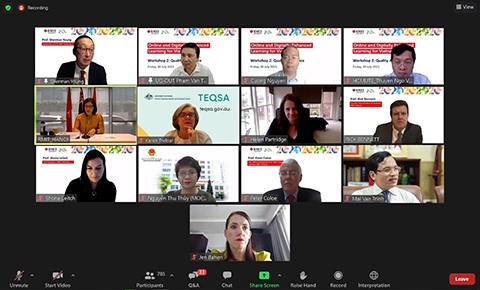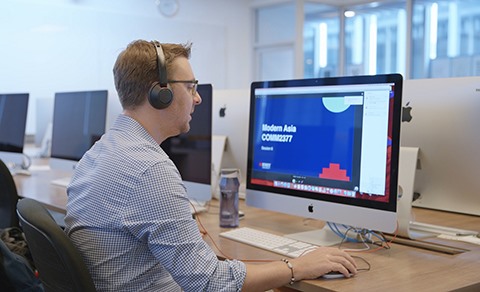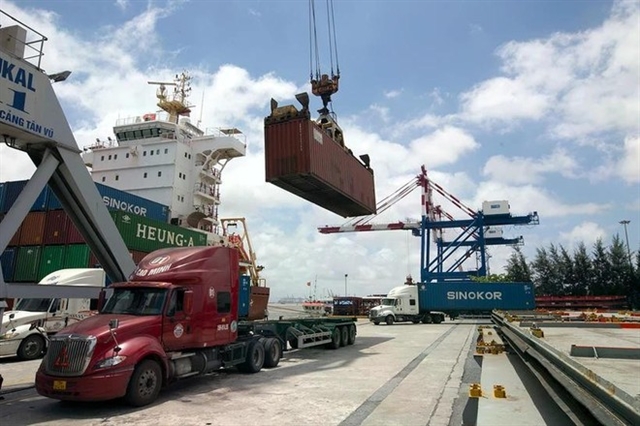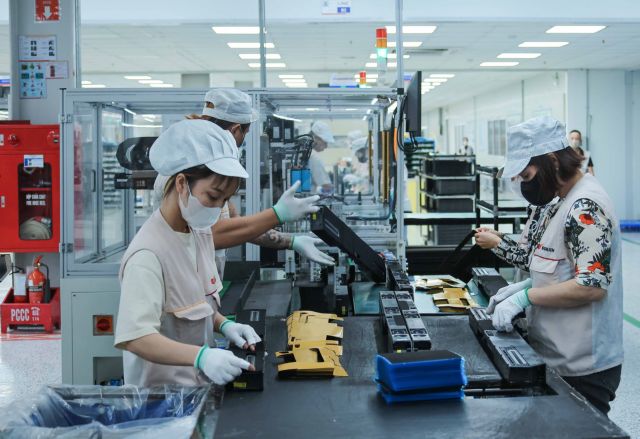

While the shift to online learning amid COVID-19 prompted discussions around how to ensure quality quickly, the conversation is now evolving into how to look more into students’ needs and use student feedback to improve quality.
While the shift to online learning amid COVID-19 prompted discussions around how to ensure quality quickly, the conversation is now evolving into how to look more into students’ needs and use student feedback to improve quality.
This trend was discussed among nearly 800 leaders, experts, and academics at the recent workshop on Quality Assurance for Online and Digitally Enhanced Learning, the biggest industry-facing event co-hosted by RMIT Vietnam since the pandemic started.

|
Nearly 800 leaders, experts, and academics at the recent workshop on Quality Assurance for Online and Digitally Enhanced Learning, the biggest industry-facing event co-hosted by RMIT University and the Vietnam Ministry of Education and Training
Drawing experience from universities and tertiary education authorities in both Australia and Viet nam, the experts shared some lessons learned from the recent period of online and hybrid learning.
A holistic approach
Representatives from RMIT University, Deakin University and the Australian Tertiary Education Quality and Standards Agency (TEQSA) all highlighted that the online student experience is more than just about learning. As such, a high-quality education needs to cater for the holistic student experience regardless of the delivery mode.
Professor Shona Leitch, Associate Deputy Vice-Chancellor Education at RMIT University, commented: “All considerations should be student-centric, from designing online course contents and learning environments, to setting learning outcomes and the actual teaching and assessment.”
Beyond that, student support mechanisms should be available on virtual platforms as well. At RMIT, student services like the library, recreation centre, student advice, academic support, wellbeing, and career advice are now all accessible online with some being accessible by students 24/7.
“We also conduct student surveys throughout the semester and quality confirmation checks on all courses, which enable us to adapt to our students’ expectations and ensure that our staff have the capability and support they need to make continuous improvement,” Professor Leitch added.

|
High-quality education needs to cater for the holistic student experience regardless of the delivery mode. Photo: RMIT University
Digital is the new norm
Experts agreed on the need to think of online learning not as a second choice, but a current necessity and constant element of modern education going forward. Such a mindset would help steer actions that improve the quality of online teaching and learning.
According to quality assurance specialist Dr Nguyen Huu Cuong, educational institutions need to prioritise equipping their faculty with the capacity to teach online and their students with the skills to learn online.
“Online education requires specific online teaching materials as well. Though a challenge for many Vietnamese institutions, the way forward for them is to upgrade their digital libraries so that both academics and students can access high-quality online resources,” Dr Cuong said.
Online delivery also urges academics to think about assessment more creatively. Authentic assessment (rather than traditional exams) has been adopted by many Australian universities including RMIT, and such experience was shared with their Vietnamese counterparts at the workshop.
Quality assurance framework
In a move to support online education, the Vietnamese Prime Minister has approved several plans to develop distance learning. Moreover, Viet Nam's Ministry of Education and Training has issued distance learning frameworks, regulations allowing a 30% online component in undergraduate and doctorate programs, criteria for assessing the quality of distance education programs, as well as research projects and directives for implementation.
According to Associate Professor Pham Van Tuan from the University of Da Nang, AUN-QA Lead Assessor, “constitutes of quality in online learning include the institutional strategy, teaching and learning methodology, online-appropriate student assessment methods, course development, professional development for online teaching staff, IT skills development for tech support staff, and more.”
“Institutions need to build an online learning quality assurance framework covering the constituent elements of quality identified, and comply with the regulations that govern online learning,” he emphasised.
Overall, the Australian and Vietnamese experts at the workshop agreed that online and digitally enhanced learning is an exciting area to collaborate in. They expect to use the lessons learned from the past 18 months to give students a much deeper and richer experience in the future.









